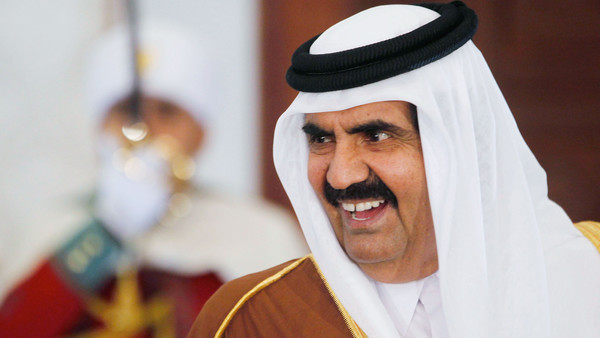March 18, 2013 10:14 pm
 ©Reuters
©ReutersQatar’s ambitions are driven by the emir, Hamad bin Khalifa al-Thani
They are everywhere. In a world of scarce capital and struggling economies, the Qatari royals have been deploying their financial muscle, snapping up landmark buildings and football clubs, global banks and famous brands.
And it is not just companies and real estate that take their fancy. Their wealth, underpinned by the world’s third largest natural gas reserves, is a potent weapon in their quest for political influence across a Middle East in transition.
A champion of Arab revolutions, Qatar has come to the rescue of febrile Islamist-led governments in Egypt and Tunisia with generous financial packages (it has spent some $5bn to shore up Egypt’s economy). It is among the most vociferous backers of Syria’s rebels, and the Libyans beforehand, helping them secure finance and weapons.
It is a striking transformation for what was once a shy, backwater Gulf state that lived in the shadow of regional giant Saudi Arabia. Qatar, with a tiny population of 1.9m, at most 20 per cent of them nationals, is driven by its need to diversify the domestic economy and an ambition to establish itself as a regional power. While its self-promotion stands in stark contrast to Saudi Arabia’s more secretive extension of global reach, Qatar is highly pragmatic, seeking strong commercial and political footholds wherever it sees rising powers.
With its region in persistent turmoil, Qatar’s spending in pursuit of global alliances is also an insurance policy. As reported by a leaked US diplomatic cable, following a $100m donation in the aftermath of hurricane Katrina, Hamad bin Jassim al-Thani, the prime minister, told an American official: “We may have our own Katrina one day.” That storm could take the guise of a US attack on Iran, which could shut the Strait of Hormuz and sever Qatar’s vital exports of liquefied natural gas.
Qatar’s ambitions are driven by the emir, Hamad bin Khalifa al-Thani, and partly put into practice by the prime minister. The involvement of Tamim bin Hamad al-Thani, the crown prince, is also growing, part of his grooming for the succession.
With hyperactivity, however, comes controversy – the latest is the UK probe into whether Barclays Bank provided a loan to Qatar to fund its cash call in 2008. Doha’s investments in France (it is also considering financial support for a fund to be run by Nicolas Sarkozy, the former president) have provoked a political backlash too. Within the Middle East itself, Qatar has accumulated as many detractors as admirers. It is seen as a saviour by some and a mischievous meddler by others. People close to the Qatari royals say they are used to controversy, having had to put out many fires over the coverage of Al Jazeera, the media arm that first put them on the global map. But some of those who have advised Qatar suggest its leaders are particularly rattled by criticism that tarnishes the shrewd investor image they have been trying to cultivate.
Qatar conducts many overseas forays through Qatar Holding, the direct investment arm of the Qatar Investment Authority, the sovereign wealth fund, whose asset base has reached $100bn since its inception in 2005. The QIA is regarded as an adjunct of Doha’s foreign policy, setting up joint investments with funds in partner states, from Indonesia to Libya.
“What we’re primarily interested in is our return on investment,” Ahmad al-Sayed, Qatar Holding’s CEO, has said. “After all, we are investing on behalf of the future generations ... if, however, this also leads to a meaningful partnership beyond the realm of earnings, all the better.”
There is no overarching QIA strategy other than “basic, generic, savvy tactics”, says David Roberts of the Royal United Services Institute. “The strategy is invest heavily if you want control, invest if it’s a bargain, invest if you can secure political points, invest in industries of critical importance, invest across sectors and regions.”
Two of Qatar’s favourite markets are the UK and France, where various state-backed companies and individuals own valuable real estate, including London’s Shard and buildings on Paris’ Champs-Élysées. Doha’s growing financial presence has made it an ally on which London and Paris increasingly rely during Middle Eastern crises. It also gives Doha European allies. In its latest expression of interest in the UK, Qatar has begun talks over £10bn of infrastructure projects, including investing in a “super-sewer” underneath London.
Bankers and financial advisers say that Qatar’s priority has shifted from gaining publicity to high returns. They also point to the kingmaker role Qatar played in the merger of Xstrata and Glencore as an example of greater sophistication. “In the past they could do big deals and vanish, they wanted the headlines, but now they want to make money,” says one adviser.
Additional reporting by Simeon Kerr
Copyright The Financial Times Limited 2017. You may share using our article tools.
Please don't cut articles from FT.com and redistribute by email or post to the web.
TOOLS & SERVICES
Multimedia
Tools
- Portfolio
- Topics
- FT Lexicon
- FT clippings
- Currency converter
- MBA rankings
- Newslines
- FT press cuttings
- FT ePaper
- Economic calendar
- Ebooks
Services
Quick links
- FT Live
- How to spend it
- The 125
- FT Property Listings
- Social Media hub
- The Banker
- The Banker Database
- Global Risk Regulator
- fDi Intelligence
- fDi Markets
- fDi Benchmark
- Professional Wealth Management
- This is Africa
- Investors Chronicle
- MandateWire
- FTChinese.com
- Pensions Expert
- New York Institute of Finance
- ExecSense
- FT Confidential Research


